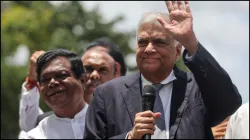Sri Lanka's Supreme Court holds President Ranil Wickremesinghe guilty of violating fundamental rights
The court rapped Wickremesinghe and the independent election commission for failing to hold local council elections last year. The elections for 340 local councils were postponed from March 9, 2023, as the Treasury claimed it could not fund the polls amid a crippling economic crisis.

Colombo: Sri Lanka's Supreme Court on Thursday ordered the government to hold the long-postponed local council elections as soon as possible, holding President Ranil Wickremesinghe responsible for violating the fundamental rights of citizens. This came as elections for over 340 local councils were postponed since early last year.
The verdict was given by a five-member bench of the apex court in response to four fundamental rights petitions filed by the Opposition and civil society groups. The court found that the members of the independent election commission and Wickremesinghe, in his capacity as finance minister, violated the fundamental rights of citizens by failing to hold the elections.
The local elections were scheduled for March 9 last year, but the Treasury claimed that it was unable to fund the election expenditure amidst the ongoing economic crisis that led to massive protests in 2022. However, the court rejected the argument, stating that the Treasury had not provided sufficient evidence to support its claim of a total inability to hold the election.
"Other than referring to the economic crisis and difficulties faced, the affidavit of the secretary to the Treasury and Ministry of Finance has not averred sufficient material to indicate a total inability to hold the election," the court said. It directed the Treasury to allocated the necessary funds for the local council elections, and said they must be conducted by the elections commission without disrupting the preparations for the presidential election on September 21.
However, Wickremesinghe said he does not regret his decision to postpone the election, saying there was no time to get involved in holding the local election as he was busy in steering a turnaround from the nation's unprecedented economic crisis that led to the ouster of his predecessor Gotabaya Rajapaksa. “Inability to hold the election due to dedicating that time to ensure the right to live is not regretted. I respect the people’s right to live as much as I respect the right to vote,” he said.
“Without cooking gas, medicine, food and fuel, people were unable to have day-to-day living. Over the last two years I dedicated myself to that task,” Wickremesinghe, who is contesting the September 21 election as an independent candidate, emphasised.
Wickremesinghe, who became the President in 2022 after his predecessor Gotabaya Rajapaksa fled the country in the wake of the 2022 anti-government protests following a severe economic crisis, was backed by the Rajapaksas, including Mahinda and Basil Rajapaksa, in winning the parliamentary vote to take over Gotabaya's remaining term.
Helped by a $2.9 billion IMF bailout programme, Wickremesinghe has stitched back the shattered economy, bringing down inflation from a steep 70 per cent in September 2022 to 1.7 per cent in June, strengthening the rupee and rebuilding previously decimated foreign exchange reserves. However, the nation is yet to recover from the effects of the economic turmoil.
(with agency inputs)
ALSO READ | Namal Rajapaksa, scion of powerful Rajapaksa family, enters Sri Lanka's presidential race | Who is he?